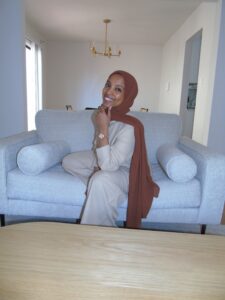The Story We Don’t Tell
Growing up, I don’t believe that I ever saw anyone talking about money. I was lucky to have a kind of a positive traditional household. My dad was a teacher, and my mom was just intuitively a person who was good with money. Growing up, she always told me that he worked, and she managed the money (they had trust between them) — which is not how it usually is in the culture that I come from. Generally speaking, the man makes all the money, and he makes all the decisions about money. That’s what a lot of girls grow up seeing.
But for me, it was different. My mother managed everything quietly but with incredible wisdom. She wasn’t formally trained, but subhanAllah, she had a natural gift for being organized and balanced. She budgeted carefully, made sure we had what we needed, and taught me, even as a 13-year-old babysitter, how to save and give with intention. She never wasted, never panicked—just planned with quiet confidence.
That example planted something deep in me—a desire to understand money, not fear it. But at the same time, I grew up hearing that men are the providers (not a bad thing) and women should “just stay home.” It was confusing. On one hand, I saw my mother’s strength. On the other, I absorbed the silent message that real money decisions weren’t for women.
A Tale of Two Realities
Historically, in my mom’s generation, women just didn’t talk about money. They had to be quiet, obedient, and dependent. If their husbands passed away, unless they remarried quickly, they often ended up struggling financially. In my own culture, for example, when my father passed away, my mother was technically supposed to marry my father’s brother. I always thought that was barbaric, but later I understood that culturally, it was meant as protection—so another man wouldn’t take the wealth her husband left.
Still, that mindset left women with no power. Their only security was to marry a man who could take care of them.
Alhamdulillah, my mom was fortunate. My father, as a teacher, was part of an annuity system that continued to pay the wives of men who passed away. That kept her afloat. But I know so many women who weren’t that lucky.
I’ve met women whose husbands handled every penny. When he died, they didn’t know how to access accounts, pay bills, or even understand what assets they had. Without family support, many of them ended up in desperate situations. Intelligent, capable women—yet trapped by silence.
That silence didn’t just affect their generation. It shaped ours too. We, the daughters of those quiet women, inherited both their strength and their silence.
The Modern Version of the Same Silence
Fast forward to today. We’re the generation of women with degrees, jobs, side hustles, and ambitions. We’re doing incredible things—earning, creating, and contributing more than ever before.
But here’s the catch: despite all this progress, many of us still don’t know how to manage, grow, or invest our money.
Research by the Federal Reserve and others shows that women are more likely to select “I don’t know” when asked financial literacy questions, while men are more likely to guess. This suggests that low confidence, in addition to a genuine knowledge gap, may be a factor. Add to that the spiritual challenge of finding halal investment options—and it’s no surprise many Muslim women don’t even know where to start.
We’re hardworking and financially independent on the surface—but unsure and disconnected underneath. We make money, but we don’t always know how to grow it.
How I Found My Voice Around Money
For me, everything changed when I started working in the financial services industry. I was suddenly surrounded by conversations about wealth, retirement, and investing—things no one had ever discussed in my community growing up.
I picked up that knowledge piece by piece and realized: it’s not complicated. You just have to start.
I learned how to invest the halal way, how to pay myself first, and how to build wealth through consistency and patience. I realized that keeping my standard of living low and saving diligently could give me freedom—not just financially, but emotionally and spiritually.
It’s easy to open a brokerage account. It’s easy to automate your savings. What’s hard is breaking the silence that tells women they shouldn’t.
That’s when it clicked for me: what’s missing isn’t opportunity—it’s education and conversation.
Why the Silence Hurts Us
Let’s be real—money isn’t just about numbers. It’s about agency, security, and dignity. When we don’t talk about it, we leave room for fear and dependence to grow.
Too many Muslim women still believe that financial literacy equals greed, or that asking about money makes you “less spiritual.” But that’s a false idea. Islam never discouraged women from financial wisdom—it encouraged it.
Khadijah (RA), one of the greatest women in Islamic history, was a successful businesswoman long before she married the Prophet ﷺ. She traded ethically, managed her wealth wisely, and used her profits to support her family and community. She wasn’t praised despite her wealth—she was praised because of how she used it with integrity and barakah.
When we understand her example, we realize that managing money with intention is a form of ibadah. It’s not materialism—it’s stewardship.
Three Truths Every Muslim Woman Should Know
- Money management is your right and responsibility.
Islam honors women’s financial independence. The Qur’an clearly says: “For men is a share of what they have earned, and for women is a share of what they have earned.” (4:32)
You are not only allowed to earn and manage wealth—you are encouraged to. - Financial silence creates financial stress.
A 2023 Fidelity Investments survey, cited by CNBC, found that women’s number one word to describe their feelings about finances was “stress,” while men’s was “hopeful”. The longer we delay learning, the harder it becomes to build stability and peace of mind. - Financial knowledge leads to empowerment.
According to the Fidelity Women & Money Study, 68% of women wish they had started investing sooner. The earlier we start learning, the more confident—and prepared—we become.
Action Steps: Breaking the Silence, One Conversation at a Time
- Start a “Money Chat” Circle.
Gather a few trusted sisters once a month. Talk openly about budgeting, saving, and halal investing. You’ll find healing in realizing you’re not alone—and strength in learning together. - Track Your Income and Spending.
You can’t manage what you can’t see. Use Empower (formerly Personal Capital) or a simple Google Sheet to track every dollar. It’s your money—know where it goes. - Build a Halal Emergency Fund.
Save three to six months of living expenses in a separate account. Avoid interest-bearing accounts if you can, or focus on minimizing riba while you save. Peace of mind is worth the discipline. - Invest the Halal Way—Start Small.
Open a halal brokerage account with platforms like Wahed or Fidelity. Begin with $50–$100 a month. Consistency matters more than the amount. The earlier you start, the more you’ll thank yourself later. - Educate the Next Generation.
Talk to your daughters, nieces, and younger sisters about money. Let them see you managing wealth, giving, and saving. Normalize financial conversations at the dinner table. Change starts at home.
A Faith Reflection: Barakah Over Numbers
Our wealth doesn’t just grow through numbers—it grows through barakah.
The Prophet ﷺ said, “The upper hand is better than the lower hand” (Bukhari), meaning giving is better than receiving.
When we earn and spend with sincerity, Allah places blessing in our wealth—even if it seems small. Financial literacy isn’t about chasing money—it’s about protecting our amanah.
When you understand money, you can use it to serve others, support your family, and build a life that honors Allah.
Let’s replace silence with shukr (gratitude) and tawakkul (trust). Because silence never built security—but action with faith does.
The Ripple Effect
When I entered the financial services industry years ago, I finally learned the language of money. It wasn’t magic—it was education. I learned that anyone—yes, even a young Muslim woman with modest beginnings—can learn to build wealth halal.
But I couldn’t help thinking: Why didn’t anyone teach us this earlier?
That question became my mission. I realized that if I could combine the financial knowledge I’d learned with the spiritual wisdom I grew up with, I could help other Muslim women find their voice around money—without guilt, fear, or shame.
That’s why I created my Halal Money Course—for women like you who are ready to take the next step, break generational silence, and start building a future filled with barakah and purpose.
If You’re Still Hesitant…
You are not behind—you’re awakening.
Every financial decision can be an act of worship when done with pure intention. Whether it’s learning to budget, opening that halal brokerage account, or simply sitting down to talk about money for the first time—you are breaking a silence that has lasted generations.
And your daughters will thank you for it.
Because this time, we’re not just earning money.
We’re rewriting the story of what it means to be a Muslim woman who leads, invests, and lives with barakah.

